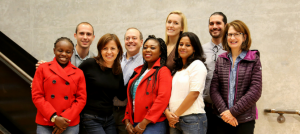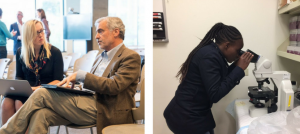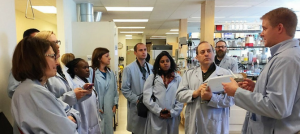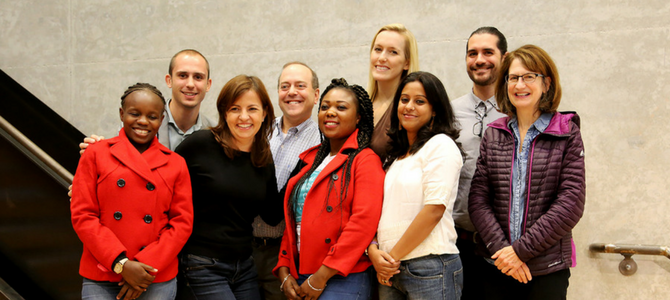By Susan Byrnes
Thousands of miles from the malaria-burdened countries where pregnant women and young children frequently die from a mosquito bite, some of the world’s foremost malaria experts are trying to outsmart a deadly parasite that has been around for at least 20 million years.
In insectaries, labs, treatment rooms and offices across Seattle, these experts have turned Seattle into a global capital for innovation to end malaria.
In late October, nine international and national journalists participated in a fellowship program sponsored by Malaria No More and the Washington Global Health Alliance to understand how innovation is speeding the path to malaria eradication. Four of the journalists came to Seattle from countries that face significant malaria burdens – Senegal, Kenya, Nigeria and India – to learn about a disease that is devastating families and economies back home.


The nine journalists who participated in the Innovating to End Malaria Press Fellowship.
The journalists visited the Bill & Melinda Gates Foundation, PATH, the Institute for Health Metrics and Evaluation, the University of Washington, the Center for Infectious Disease Research, The Fred Hutchinson Cancer Research Center, and the Global Good Fund and Intellectual Ventures Laboratory. Each of the organizations is making a significant contribution to the malaria fight – with exciting innovations like vaccines, more effective drugs, highly sensitive diagnostic tests, an automated diagnostic microscope, and data and surveillance strategies to pinpoint the malaria parasite so we can better direct resources.


Left: Catherine Cheney of Devex and Larry Slutsker, Director, Malaria and NTDs at PATH, discuss PATH’s role in the fight against malaria.
Right: Elizabeth Merab of the Daily Nation observes malaria parasites through a microscope at the Center for Infectious Disease Research (CIDR).
In one novel partnership called Visualize No Malaria, the Seattle-based Tableau Foundation is using its software and expertise to help PATH accelerate malaria elimination in Zambia. Even the public is getting involved in fighting malaria – voluntarily getting infected with malaria through mosquito bites or injections – to help test new drugs and vaccines through “human challenge” trials.
Intellectual Ventures founder Nathan Myhrvold recently called Seattle the “Silicon Valley of saving the world.” At a dinner with the journalists, he said no city cares more about global health than Seattle. While the journalists were visiting Seattle, Bill and Melinda Gates made one of the largest gifts ever to the University of Washington – $210 million to its Population Health Initiative to construct a new building and further its mission of improving health for people around the world.
In large part due to the Gates Foundation’s commitment to ending malaria, Seattle is now densely populated with global health innovators who are working across the spectrum on new approaches and tools to combat the disease. The region also co-produced the first business plan to end malaria – Aspiration to Action: What will it take to end malaria – by Bill Gates and Ray Chambers, the United Nations Special Envoy for Malaria. Seattle organizations readily share infrastructure, resources and knowledge, creating a dynamic and collaborative environment for innovation.


The journalists take a tour of the lab and shop at PATH.
We need this innovation for malaria now more than ever. Strong leadership and smart approaches have saved 6.2 million lives since 2000 and cut the malaria death rate by 60 percent. Bill Gates recently called malaria one of the greatest success stories in the history of global health. We have a plan to end the disease within a generation, but we need new funding, new approaches and new tools. Malaria still kills a child every two minutes, and mosquitoes and the diseases they carry are building resistance to our existing insecticides and drugs. The final chapter of the fight promises to be the most challenging yet.
With bold leadership, we can be the generation that wipes malaria off the face of the earth.



